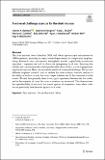A retrieval challenge exercise for the Ariel mission
Abstract
The Ariel mission, due to launch in 2029, will obtain spectroscopic information for 1000 exoplanets, providing an unprecedented opportunity for comparative exoplanetology. Retrieval codes - parameteric atmospheric models coupled with an inversion algorithm - represent the tool of choice for interpreting Ariel data. Ensuring that reliable and consistent results can be produced by these tools is a critical preparatory step for the mission. Here, we present the results of a retrieval challenge. We use five different exoplanet retrieval codes to analyse the same synthetic datasets, and test a) the ability of each to recover the correct input solution and b) the consistency of the results. We find that generally there is very good agreement between the five codes, and in the majority of cases the correct solutions are recovered. This demonstrates the reproducibility of retrievals for transit spectra of exoplanets, even when codes are not previously benchmarked against each other.
Citation
Barstow , J K , Changeat , Q , Chubb , K L , Cubillos , P E , Edwards , B , MacDonald , R J , Min , M & Waldmann , I P 2022 , ' A retrieval challenge exercise for the Ariel mission ' , Experimental Astronomy , vol. 53 , no. 2 , pp. 447-471 . https://doi.org/10.1007/s10686-021-09821-w
Publication
Experimental Astronomy
Status
Peer reviewed
ISSN
0922-6435Type
Journal article
Rights
© The Author(s) 2022. Open Access This article is licensed under a Creative Commons Attribution 4.0 International License, which permits use, sharing, adaptation, distribution and reproduction in any medium or format, as long as you give appropriate credit to the original author(s) and the source, provide a link to the Creative Commons licence, and indicate if changes were made. The images or other third party material in this article are included in the article's Creative Commons licence, unless indicated otherwise in a credit line to the material. If material is not included in the article's Creative Commons licence and your intended use is not permitted by statutory regulation or exceeds the permitted use, you will need to obtain permission directly from the copyright holder. To view a copy of this licence, visit http://creativecommons.org/licenses/by/4.0/.
Description
Funding: JKB was supported by a Royal Astronomical Society Research Fellowship during this project. This project has received funding from the European Research Council (ERC) under the European Union’s Horizon 2020 research and innovation programme (grant agreement No 758892, ExoAI and grant agreement No 776403, ExoplANETS-A) and under the European Union’s Seventh Framework Programme (FP7/2007-2013)/ ERC grant agreement numbers 617119 (ExoLights). Furthermore, we acknowledge funding by the Science and Technology Funding Council (STFC) grants: ST/K502406/1, ST/P000282/1, ST/P002153/1 and ST/S002634/1.Collections
Items in the St Andrews Research Repository are protected by copyright, with all rights reserved, unless otherwise indicated.

